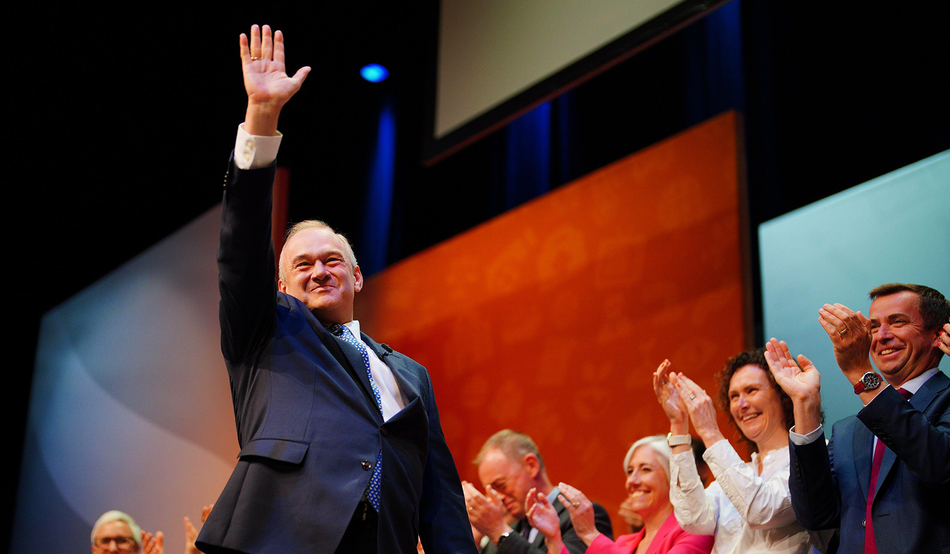The country is in a mess. Labour and the Tories are in the doldrums. Brexit has failed. Nigel Farage is gaining political momentum and is more extreme than ever. This ought to be the Liberal Democrats’ moment, so where are they?
In parliament, the Lib Dems are the third largest party, with 72 MPs, the largest third party contingent in more than a century (compared to just five MPs for Reform UK). The Lib Dems also hold strong sway in local government, with more than 3,000 councillors nationwide.
Yet just a year out from the general election, they are languishing in the polls and seem to be almost entirely absent from the national debate, which has become a dialogue between Farage and the government. Even this week, during the Lib Dem conference, Farage stole the media show with his plan to deport hundreds of thousands of perfectly legal immigrants.
Let’s pause to consider this latest Reform broadside, which would retroactively strip people of their “indefinite leave to remain” status and replace it with five-year visas requiring a high income threshold.
This is the first time Farage has publicly called for the mass deportation of legal immigrants. To carry out this monstrous policy would require Britain not only to withdraw from the European Convention on Human Rights and other international agreements, but also to abolish virtually all human rights protections in existing UK law. And then there are a host of mind-boggling practical and moral issues to be addressed.
Until recently, Farage would not have dared venture so far. Had he done so, the media would have reacted in disbelief and derision, and the condemnation from his opponents would have been resounding. This week, however, the media (including the BBC) gave his announcement live TV coverage and star billing. Questions were raised about the detail and practicability, but it was treated as a serious proposal.
While the Lib Dem leader, Ed Davey, did say he was totally opposed, both Labour and the Tories focused mostly on errors in the estimate of £234bn of projected savings in government spending. The government said it was anyway proposing to change the law to make it harder to obtain indefinite leave to remain. There was no “popular front” of outrage and condemnation.
We are clearly witnessing a crisis of British liberalism. You can identify a string of causes: from Trump, global populism and the international migration surge; through to Brexit, the rise of GB News, the collapse of moderate Toryism and UK economic weakness. There is also, of course, the radicalisation of domestic attitudes to migration in response to the small boats and the “Boriswave” of legal, low-skilled non-EU immigration post-Brexit. The cumulative effect is to create a larger audience and appetite for Farage and his patent remedies, and to put liberals on the defensive.
But despite topping polls, with support for Reform fluctuating at around 30 per cent, there continues to be a huge constituency beyond Farage’s voter base. The trouble is, it lacks a leader able to unite it against Farage. Davey is just one of a cast of centrist and left-wing leaders vying for attention, alongside Keir Starmer, Zack Polanski, John Swinney, Jeremy Corbyn and others. And apart from a sideline in televised stunts, the Lib Dem leader hasn’t broken through in a really significant way with any particular message.
Davey might have been forgiven for seeing the mess the other major parties have gotten themselves into, and letting them fight it out among themselves. But the crisis for British democracy is now too great, and the potential opportunity for the Lib Dems too promising, for them to stay quietly on the sidelines of national debate.
The party has a strong regional base in the more affluent Home Counties, and in southwest England, where they have capitalised in particular on the Tory middle-class collapse since Brexit. Hence their 72 MPs and so many councillors. This may have further to go, not least if Farage destroys what is left of the Tory party. But the Lib Dems will continue to be marginal national players unless they can combat Farage head on, speaking out against the new populism with a powerful liberal voice. Perhaps Ed Davey can finally find his












